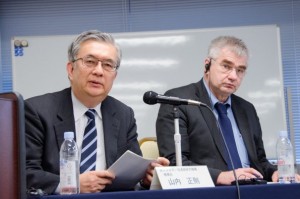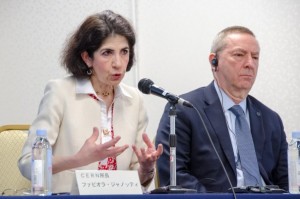
Masanori Yamauchi (left) and Joachim Mnich (right) at the ICFA press conference. Image: Nobuko Kobayashi
On 26 February, members of the International Committee for Future Accelerators (ICFA) gathered in a conference room in Tokyo, Japan, for the press conference. Joachim Mnich, Research Director at DESY and the current chair of ICFA, Nigel Lockyer, Director of Fermilab, U.S., Fabiola Gianotti, Director-General of CERN, and Masanori Yamauchi, Director-General of KEK sat at the conference, explaining the status of accelerator science in the world.
Mnich introduced the mission of ICFA: it facilitates international collaboration in planning, construction and exploitation of accelerators for high-energy physics and related fields, and it has 40 years of history in international collaboration. He said that ICFA’s major topic over the last years was the ILC. ICFA has proposed and promoted the ILC as a global project, and repeatedly confirmed its support for the ILC, which is in a mature state of technical development. “ICFA decided yesterday on its continuous study and support, and set up the sub group toward the realisation of the ILC” he concluded his talk with the decision made by ICFA’s meeting.
Lockyer emphasised the international nature of particle physics, saying “particle physics has enjoyed international cooperation beyond any other field of science for many decades. We were able to exchange technical and scientific know-how as well as culture, and people learning about science together.” He explained that the bottom quark was discovered at Fermilab, and the Belle experiment at KEK played a significant role to investigate the properties of the bottom quark. “The way particle physics goes is that you discover the particle, and you want to study it in detail. So, the ILC can study the Higgs boson in detail, in the same way KEK studied bottom quark in detail. A world-wide ambition is to study the Higgs in exquisite detail, which require a very special type of accelerator. The ILC is capable of doing that.”

Fabiola Gianotti, CERN, (left) answering a question from a journalist (on the right: Nigel Lockyer, Fermilab) Image: Nobuko Kobayashi
“You might think the Higgs boson is something far away from our everyday life, but actually it is not,” said Gianotti in her talk. “ This tiny particle is very, very special. Without the Higgs boson, our own existence is not possible,” she stressed the importance of further study of the Higgs boson. She said that many people often ask if the Higgs boson will change people’s lives, and her answer to that question is “it does already”. In order to find this particle, scientists have developed many cutting-edge technologies in many fields. She gave the example of the medical applications and also the world wide web, invented by the physicists to communicate with colleagues overseas, which has drastically changed the way we live.
“The motivation for much of the research in particle physics is to go beyond the standard model,” Yamauchi said. “If we can go beyond the standard model, universal questions such as “what is dark matter?” or “why is there are no anti matter around us?” can be answered”. He said that world scientists are tackling this challenge by international collaboration and competition. “The ILC is one of the tools for next-generation research, and around the world scientists are hoping for its realisation. Now the Japanese government is carefully reviewing the project at the ILC Advisory Panel, and I hope positive conclusion is reached timely,” he said.
One of the journalist asked Gianotti about the general critique for spending big budget on fundamental science research. “Fundamental research always benefits society,” Gianotti replied. She said that gaining fundamental knowledge itself is very important already. In addition to that, there are new technology developments and spin-offs in so many areas. She also made comparison on the CERN’s budget that it is about same scale of average medium-size university in Europe, and “one cappuccino per European citizen per year.” She emphasised the important role of CERN in education that “it helps so many young people to grow. 3000 PhD students have studied at LHC experiments.”
This conference was not like a usual press conference to announce a new discovery, but worked well to give the journalist the idea of true international collaboration.

Recent Comments